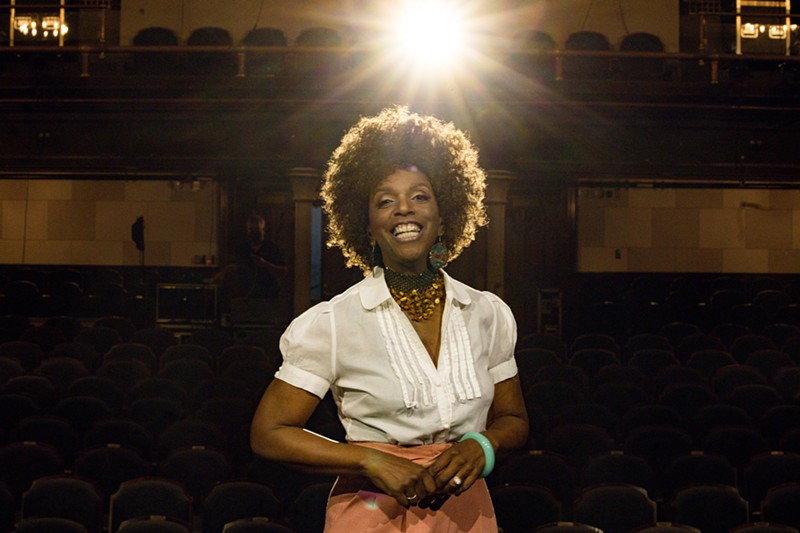Satori Shakoor on what makes the Secret Society of Twisted Storytellers a Detroit phenomenon
From Bride of Funkenstein to Twisted Storyteller
[
{
"name": "GPT - Leaderboard - Inline - Content",
"component": "35519556",
"insertPoint": "5th",
"startingPoint": "3",
"requiredCountToDisplay": "3",
"maxInsertions": 100
}
]
The crowd is hushed to a deafening silence as Rev. Edward Knox relives having to identify his son’s lifeless body. His hands tremble and a tangible pain pours from his voice as he tells his story of despair, questioning God, and being humbled.
Rev. Knox is one of the speakers at Detroit’s Secret Society of Twisted Storytellers for the evening, though it's anything but a secret. The curated show where real people share stories of hardship, joy, resilience, and eventual triumph, has been around since 2012.
After a two-year hiatus in 2020 and 2021 due to COVID-19, it finally returned in the spring of this year.
In the beginning, Storytellers was held inside a tiny storefront with 70 folding chairs set up for the audience. Since then it has grown to pack the Charles H. Wright Museum, where it was held until the coronavirus shutdown, and now audiences flock to the Marygrove Theatre to see the show. It often sells out with people rounding up their friends and sometimes entire families for the evening.
When my aunt invited me to Storytellers at the Charles H. Wright Museum in 2015, I had no idea what to expect. Do random people just get on stage and tell stories? What’s so interesting about that? Why would I want to pay to listen to them?
After several hours in that packed auditorium, it all made sense. What makes Storytellers great is the relationship that it fosters between the speaker and the listener. It reminds us of our connected humanity — that we’re all having a human experience filled with joy and pain, and if we took the time to listen to each other, we’d realize we’re not so different.
The magic also lies within electric host and Storytellers creator Satori Shakoor. Shakoor is a hilarious and upbeat powerhouse with a voice (and name) that you’ll never forget. You wanna talk about a legendary Detroiter? Shakoor is it. She’s opened for Joan Rivers as a stand-up comedian. She toured with George Clinton and Parliament-Funkadelic as a Bride of Funkenstein. She’s written for Canadian television and is an accomplished actor.
She’s also a 2017 Kresge Literary Arts Fellow in the storytelling category (which was pretty much created for her), and hosts Detroit Performs: Live at the Marygrove and WDET’s Twisted Storytellers podcast. I could go on, but you get the idea.
Speaking to Shakoor over the phone feels like my own private show of Storytellers with the master herself.
Shakoor started Storytellers in 2012 following the death of her mother and her son. At the time, she had recently moved back to Detroit and was out of work after performing and touring all over the world.
“It had been about six years since I lost my mother and nine months later my son,” she remembers. “I went on this six year grieving process and when I came out of it, Wall Street had crashed, I had been working as an actor and was out of work. They wouldn’t extend my unemployment benefits, which I had earned… I didn’t like that feeling of dependency so I took a stand that I was gonna do what I loved to do no matter what.”
She was working at Macy’s when a friend invited her to Cliff Bells for The Moth, a national event where people tell their stories in a competition format. She came in second place on her first try and won the second time. Though she ended up losing the grand slam competition after that, she was offered a job as a main storyteller and host of The Moth in Ann Arbor.
“When I won the Moth I said,’ I bet I can make more money telling stories than at Macy’s,’” she says. “I proved that but what I noticed more than any paycheck was that my story was healing me. When I looked around at Detroit I realized me and the city were the same — with all the punishments that have been happening since 1967 with water shutoffs, the housing crisis, and all the processes of gentrification — we were both going through a transformation and needing to be healed.”
Shakoor actually started the Secret Society of Twisted Storytellers while she was hosting The Moth. Storytellers is more based on community building, she says, which was desperately needed in Detroit.
“When I moved back to Detroit in 2011, I saw all these abandoned houses, drug dealers that were really the neighborhood watch, only 11 people living on the block, and graffiti being the most beautiful artwork you could find in the neighborhood,” she says. “I felt gutted and wondered, what if people could use their own personal living experience to express and heal themselves and make a contribution to all who are listening. Ten years have proven that it’s working.”
She’s right. Storytellers’ mission is to “connect humanity, heal and transform community, and provide an uplifting, thought-provoking, soul-cleansing entertaining experience through the art and craft of storytelling,” she tells me. And that’s exactly what it does.
After Rev. Knox told his impassioned story of processing grief, Shakoor says she was approached by his wife.
“She said, ‘I’ve never heard him ever express himself like that about our son.’ I think it kinda healed the family a bit because they were actually able to see his grief,” Shakoor says. “Families come thinking they know their family members, or ‘I’ve heard this story so many times before,’ but they hear it differently through the ears of an audience member.”
She continues, “I’ve had trans women on the show and Black men in the audience will call me afterward and say, ‘I’ve never met or been that close to a trans person… but I could relate to them.’ In relating to her story, she could be human. Storytellers breaks down generational barriers, racial barriers, gender barriers, all of it.”
Some notable speakers in the past ten years include Derrell Siggers, who spent 34 years in prison for a murder he says he didn’t commit, and Anita Posey, who killed her boyfriend for physically abusing her infant son.
“The fact that [Siggers] didn’t have any bitterness was just… amazing,” she says. “I like stories where people have had life be on their neck and somehow still find gratitude.”
So what makes a good story?
“High stakes,” Shakoor says. “If this is the case, how did you end up standing here telling it? Those are the more riveting and compelling stories. What did the storyteller learn so they can give wisdom back to others?”
If you’ve ever wondered whether the stories are always 100% real, they are, but Shakoor does coach presenters on their delivery.
“I don’t tell them what to say, I just give them the craft through which to say it,” she explains. “I’ve had people come to me with this little poem that makes my eyes glaze over, and I start asking them deeper questions and now they’re in tears, and I say, there you go. That’s the story. I know public speaking is human beings’ number one fear. It’s like you’d rather die than get up on stage, I get it. But I know I can help anyone tell their story. We’ve had over 500 people on stage.”
Shakoor became the master storyteller she is today by listening to her family members who were “old Black women in the south,” as she puts it.
“They were uneducated but they could create novels in your mind. So that’s what I grew up around and that’s what I knew.”
While she learned the art of storytelling from her southern family, touring with P-Funk taught Shakoor some of her greatest lessons about being a performer.
As she tells it, Shakoor joined the Brides of Funkstein when P-Funk was at the very pinnacle of their success, just as One Nation Under a Groove was being released in the late 1970s. The next two years saw hit after hit, but Shakoor remembers one night in particular when only 500 people came to see their show in Atlanta.
Five hundred people may sound like a lot, but this is P-Funk we’re talking about and the Fox Theatre, where the show was held, had 50,000 seats.
“I was kind of disappointed, but [George Clinton] said, ‘You have to play harder for them because they’re the ones that came.’ So he would give them the show of their life, no matter how many people showed up. He had a lot of wisdom that I could inherit and apply.”
The 10-year journey creating, building, and growing Storytellers hasn’t always been easy, but Shakoor has used all of the wisdom she’s gathered throughout her life to make it happen.
“I went from having the lights turned out, renting chairs for $1 each, setting them up and breaking them down, to hosting Storytellers at Marygrove [Theatre],” she says. “It’s been quite a journey but it’s been worth it every step of the way. And there’s still a lot of work to be done. There’s a lot of people who are still afraid to tell their truth.”
The next Twisted Storytellers is Friday, June 17 from 7:30 -9:30 p.m. at Marygrove Theatre. The theme is “Lion Kings” featuring stories by Orlando Bailey, Charlie LeDuff, Orlando Rivera, and Jacob Walker, with live music from Charles Martin and a dance performance from Kevin Collins and Pamela Moore. Tickets are $20 and must be purchased online in advance. No tickets will be available at the door. More information is available at twistedtellers.org.
Stay connected with Detroit Metro Times. Subscribe to our newsletters, and follow us on Google News, Apple News, Twitter, Facebook, Instagram, Reddit, or TikTok.








